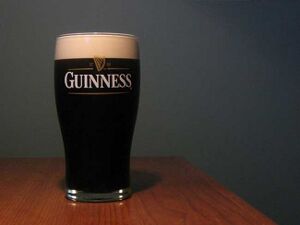Beer: Difference between revisions
From Cookipedia
No edit summary |
No edit summary |
||
| Line 1: | Line 1: | ||
[[Image:Guinness.jpg|thumb|300px|right|A pint of Guinness]] | [[Image:Guinness.jpg|thumb|300px|right|A pint of Guinness]] | ||
Regarding culinary use, '''Beer or ale''' can refer to: | Regarding culinary use, '''Beer or ale''' can refer to: | ||
{{GbLeftOtherPages}} | |||
* '''[[Pale ale|Bitter]]'''; As you would expect, a slightly bitter flavour | * '''[[Pale ale|Bitter]]'''; As you would expect, a slightly bitter flavour | ||
** Good with beef | ** Good with beef | ||
Revision as of 17:13, 19 March 2014

Regarding culinary use, Beer or ale can refer to:
- Bitter; As you would expect, a slightly bitter flavour
- Good with beef
- Brown ale; Similar to Guinness
- Good with beef
- Cider; Apple flavours, slightly tart or sweet, depending on the type
- Good with pork, beef
- Guinness; Bitter and nutty
- Good with beef
- Lager; The weakest flavour of all (in cooking terms)
- Good with most meats
- Mild; Similar to Brown ale, though weaker
- Good with beef
- Newcastle brown ale; Similar to Guinness
- Good with beef
- Stout; Similar to Guinness
- Good with beef
In most recipes these are relatively interchangeable. Substituting one for another will change the flavour slightly but will probably work ok.
Meat especially is tenderised by cooking in ale, normally the longer the better.
Lager is good to bulk up a stock and because it does not have a very strong flavour so is less likely to overpower a dish.
Be bold, experiment!